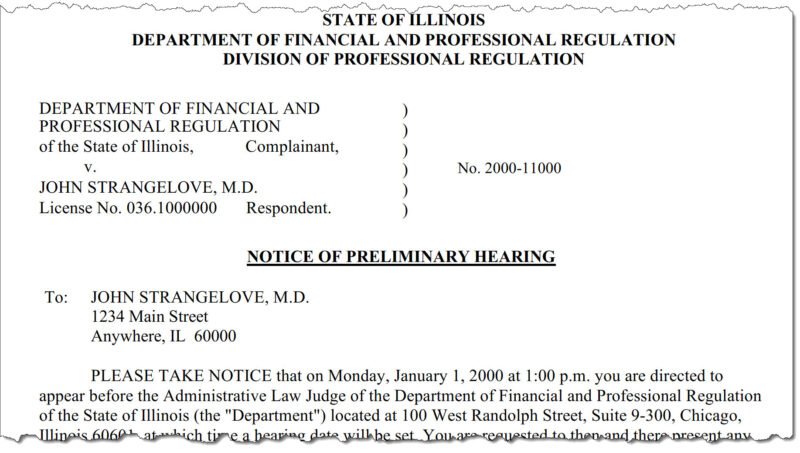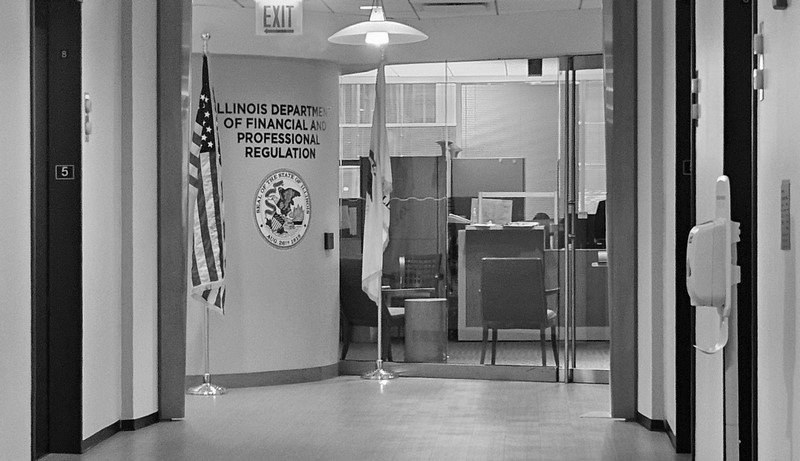Illinois Medical Licensing Board (IDFPR) Attorney Representation
Receiving a letter about a disciplinary matter from the Illinois Medical Licensing Board or a visit from an Illinois Department of Financial and Professional Regulation investigator can be a scary experience. Attorney representation can make the disciplinary process less stressful. DO NOT ignore IDFPR communications! The issue will not go away and adverse action will likely be taken against your professional license if you do not respond.
Common Reasons for Illinois Medical Licensing Board Complaints
Patients, families, caregivers, and even other medical providers may file complaints with the IDFPR about a physician’s actions. The Illinois Medical Practice Act lists FIFTY reasons for which disciplinary actions can be taken against licensed professionals. Although this is not an exhaustive list, here are some of the more common issues that often result in complaints against physicians licensed in Illinois:
- Unprofessional Conduct: This encompasses a range of behaviors, from failure to maintain adequate professional boundaries with patients to engaging in inappropriate relationships or neglecting to provide informed consent.
- Substandard Care: Allegations of providing substandard care, whether through negligence or lack of up-to-date medical knowledge, can lead to complaints being filed. Such complaints are usually assessed by medical experts to determine if the physician’s care was indeed below the accepted standard.
- Substance Abuse: Any evidence of alcohol abuse or illicit drug use among healthcare professionals is taken very seriously by the Illinois State Medical Licensing Board.
- Fraud or Misrepresentation: Any attempt by a physician to deceive patients, insurers, or the medical community can lead to severe repercussions. This includes falsifying medical records, billing for services not rendered, or overstating professional qualifications.
- Criminal Activity: Engaging in criminal behavior, whether related to professional duties or personal life, is likely to trigger a formal complaint with the licensing board.
- Inadequate Record Keeping: Failure to maintain complete medical records can result in complaints, particularly if it hinders a patient’s care or fails to support the treatments administered.
- Improper Medication Prescription: Allegations of overprescribing, particularly concerning controlled substances can arise from a lack of thorough assessment of a patient’s condition or valid patient needs. Complaints may also occur if a physician fails to monitor the patient’s response to a prescribed medication, especially in cases where the medication has a high potential for abuse or causes patient harm.
- Negligent Supervision: The IDFPR routinely sanctions physicians who allegedly fail to properly supervise medical assistants, nurse practitioners, physician assistants, or other healthcare personnel.
- Failure to Pay Income Taxes: Under Illinois Law, a business or professional license may be disciplined for failing to file income taxes or failing to pay any income tax that is due.

Potential Adverse Actions Taken by the Illinois Medical Licensing Board
- Fine – a monetary fine of up to $10,000 per incident may be imposed as a form of discipline or in addition to any other disciplinary action
- Reprimand – an official record of discipline which may be public or private
- Probation – a licensee can continue practicing medicine subject to varying restrictions which often include progress reports made to the medical board. If the licensee violates the terms of probation, additional sanctions can be taken including medical license suspension or termination
- Suspension – a licensee is prohibited for practicing medicine during the term of the suspension. Suspensions may impose additional requirements prior to reinstatement of licensure
- Refuse to Renew – licensees may continue to practice under their current license, but when the license expires (usually every 3 years) the license cannot be renewed and a new license application will not be accepted.
- Revocation – a licensee is prohibited from practicing medicine and must wait a minimum of 3 years to file a Petition for Restoration
Adverse actions taken by state medical boards are usually reported to the National Practitioner Databank and may affect a physician’s ability to obtain licensure, apply for hospital privileges at healthcare institutions, and secure medical malpractice insurance.
Importance of Legal Representation for Illinois Medical Licensing Board Disciplinary Actions
The repercussions of medical licensure actions can be significant including potential loss of licensure, future professional licensing issues, damage to professional reputation, and significant financial loss. An unrestricted active license is not just a credential, it is a key component of a medical provider’s professional identity and livelihood.
Medical professionals are often ill-equipped to handle legal intricacies of medical license defense on their own. Attempting to navigate such legal matters without professional representation can result in costly mistakes. Whether it’s agreeing to an interview with IDFPR, submitting inappropriate documents or statements under pressure, or providing information that could be misconstrued, the consequences of license defense missteps can be significant.
Experienced medical license defense attorneys understand the relevant laws and regulations and can provide the necessary guidance to help medical doctors navigate disciplinary challenges. Legal counsel can assist with gathering evidence, preparing statements, and formulating arguments that highlight a provider’s professional conduct and commitment to ethical practice. Medical license lawyers can also help you understand your obligations, the implications of regulatory actions, and the steps needed to achieve compliance with state laws. Attorneys may bring an objective perspective to your case, allowing you to focus on your practice and patient care while they handle the complexities of the legal process.
I have represented many physicians before the Illinois State Medical Board. Some issues can be resolved with a few brief e-mails. More serious disciplinary proceedings may require a formal hearing or even an appeal to state courts for administrative review or civil action.
If you’ve received a notice from the IDFPR, please contact me. I’ll be happy to discuss your options with you.
